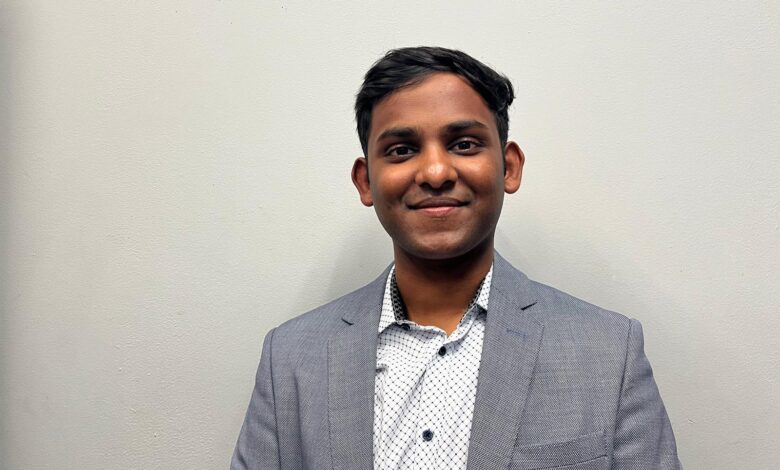From child prodigy to serial entrepreneur: The inspiring journey of Amruth Pabba

By Ritu Jha-
Indian American Amruth Pabba embarked on his tech journey at a tender age. By 12, Pabba developed his first Edtech app and achieved his first successful exit by 14. Now, at 24, he is a serial entrepreneur, investor, innovator, and, most importantly, an individual driven by curiosity for the world around him.
“I started programming when I was six, self-taught from a book I borrowed from the library,” Pabba told iNDICA. He was one of the judges at MoonBattle and is currently working on a Fintech startup that is in a stealth phase. “I’m incredibly fortunate to have had supportive parents.” Despite his parents lacking a computer science background, they provided him with resources. “We visited the library, and I found an HTML book. With the help of an older cousin, I set up my first HTML page, sparking a lifelong journey of learning.”
He created his first website for his personal use where he could store his favorite websites and games. “I come from a different era, 10-15 years ago when YouTube had just a handful of videos,” Pabba said. Today, platforms like Code Ninja and coding academies, along with organizations like Moonpreneur offer comprehensive programs for young students. But when he was eight or nine years old, these resources didn’t exist.
To overcome the lack of resources, Pabba’s parents reached out to India for assistance. His father engaged with a training institute there and hired a specific instructor. Despite the time zone difference – night in India and daytime in the US – the instructor helped him learn C programming during the summer. The books he received from India weren’t sufficient, but this unique journey shaped his experience. Today, it is amazing to witness how technology has evolved. “We have thousands and thousands of minds that are available at the tap of a mouse away today. And this is something these kids are immensely gaining from. I wish I had these resources. But I’m still young and there’s a lot to learn. I’m grateful that I had the resources, but these kids, the wonders they will make, and the ideas they’re bringing to the table are incredible,” Pabba added.
“Silicon Valley not just today, but has always been a beacon of innovation and hope. You often hear incredible stories of people arriving here with nothing more than a suitcase and a toothbrush only to exit as founders of billion-dollar companies. This transformation does not occur overnight or with mere luck,” Pabba said.
In this hub of technological advancement, we’ve witnessed world-changing technologies emerge. Some of these young innovators have parents who played pivotal roles in these innovations. Contrastingly, his upbringing in Chicago lacked the environment necessary to witness such rapid growth.
“Nevertheless, times have changed. The Internet’s power has revolutionized how information flows, and we now have an abundance of startup incubators and innovation hubs. I’ve actively participated in our local community, encouraging youth entrepreneurship,” Pabba added.
Similar to Moonpreneur, he too has created a beautiful program for children. But they are very rudimentary compared to the turnkey solution that Moonpreneur has to offer.
Pabba began his entrepreneurial journey at the age of 12, fueled by a multitude of ideas. His first venture was an Edtech app. [iOS Application Creator – Classroom Management Platform] application. Within the next couple of years, he exited earning a modest sum. While he did not amass millions from this endeavor, the experience immersed him in innovation and technology. He keenly observed trends, made strategic investments, and participated in various companies, ultimately shaping his path to where he stands today.
At 18, he launched his second company, QuickPi, in the home automation space. Later, he ventured into the Fintech space. But then India went from no internet in the homes to people having 5G connectivity in their houses and on their phones, and you can see an explosive growth of the internet. “As someone in the Fintech space, with a fair knowledge about the industry, India has made a huge leap in payments. The UPI technology has catapulted India from a cash-based society to a cashless society,” he said.
Pabba, who frequently visits India, emphasizes that the Fintech market there is thriving. India’s progress outpaces that of the US.
“What the Indian government and its people have achieved is truly remarkable. This underscores the importance of top-level support for innovation. In my opinion, revolutionizing the payments industry is not a simple task. While Fintech in America is advancing rapidly, we still grapple with outdated bureaucracy, processes, and methodologies. In contrast, India chose to leap forward decisively,” Pabba said.
During one of his visits to his native place Hyderabad, he witnessed street vendors – many without laptops – using their phones effectively. They used Google Translate and the UPI to run their day-to-day businesses. A decade ago, this level of digital empowerment would have been unimaginable. It’s a culmination of the Indian mindset, growth trajectory, and the nation’s aspiration to become a global powerhouse. Without a doubt, India is poised to lead for the next two or three decades.
When asked about his latest project in the fintech space, the young entrepreneur shared, “We’re developing a solution related to the payments sector, distinct from UPI. The US payment landscape holds immense potential, but accepting money online is not easy due to existing market giants. Nevertheless, we firmly believe there is room for innovation and other competitors. My team and I are actively working on addressing this challenge.”
Speaking about lessons learned in his journey, Pabba said: “Being in Silicon Valley, one of the prevailing narratives revolves around dropping out of school, becoming the next millionaire, and going after that ambition. But I’ve been very fortunate to believe in academics. I took academics very seriously.”
According to Pabba, regardless of whether you’re 50, 60, or 20 years old, it’s crucial to stay informed about emerging technologies, market trends, and ongoing changes and capitalize on them. Being a lifelong learner is essential for success in this dynamic industry.
Asked how he learned the skills of networking, connecting, and selling, Pabba said he believes that it is an ongoing process. “My dad always said that there was no need to rush; life should be enjoyed. However, my motivation and interest in shaping a unique future drove me to pursue what I do.”
“I didn’t have a big VC scale or any hundred-million dollar raises. I had a very simple app and built it on my own with my cash. I’m a believer in profitable businesses. I know Silicon Valley has a different approach to business where raising funds, building aggressively, and having heavy growth is important. I’m much more traditional with business building. I believe in seeing profitability and gradually scaling it up.”
Pabba does not believe in all work and no play. “Balancing your calendar is crucial. Amidst the chaos of the world, self-care remains essential. I’m an avid race car driver. I’ve been spending lots of time on the track and working on honing my skills. I’m an enthusiastic traveler, aiming to visit all seven continents this year. I don’t think I push myself a lot. Personally, burnout isn’t a concern for me. I’m very careful with how I spend time and where I’m spending it. Giving back to the society holds great importance to me. Being involved with Moonpreneur and engaging in conversation is a step in that direction.”



